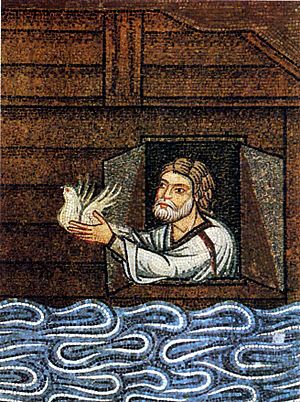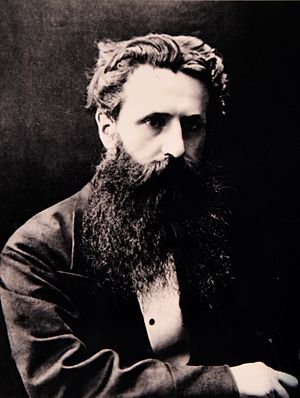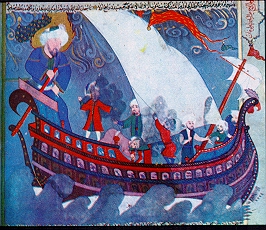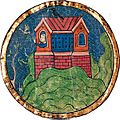Noah facts for kids

Noah (meaning rest or comfort) is a man in the Abrahamic religions. He was the son of Lamech, and the father of sons, Shem, Ham, and Japheth. Noah and his ark is in the Book of Genesis, which also describes Noah as the 'first man to plant a vineyard' (chapter 9).
The Ark
As described in the Book of Genesis, Noah and his family kept believing in God in a time when most people were not. Knowing this was true, God told Noah he was going to flood the world, so he could drown out evil. He told Noah to build a boat called an ark. Noah was to put himself, his family, and two (a male and a female) of every kind of animal on it. People laughed at Noah at first, but they were killed by the flood. Noah and family stayed on the ark until they reached land. To find land Noah sent out a dove, which returned with an olive branch. After the flood, God made a rainbow as a promise to say that he would never destroy the Earth by flood again. When they were able to walk on dry land, the animals were released and they were able to repopulate the earth.
Noah, as the last of the extremely long-lived Antediluvian patriarchs, died 350 years after the flood, at the age of 950, when Terah was 128. The maximum human lifespan, as depicted by the Bible, gradually diminishes thereafter, from almost 1,000 years to the 120 years of Moses.
Comparative mythology
Indian and Greek flood-myths also exist, although there is little evidence that they were derived from the Mesopotamian flood-myth that underlies the biblical account.
Mesopotamian

The Noah story of the Pentateuch is quite similar to a flood story contained in the Mesopotamian Epic of Gilgamesh, composed c. 1800 BCE. In the Gilgamesh version, the Mesopotamian gods decide to send a great flood to destroy mankind. Various correlations between the stories of Noah and Gilgamesh (the flood, the construction of the ark, the salvation of animals, and the release of birds following the flood) have led to this story being seen as the source for the story of Noah. The few variations include the number of days of the deluge, the order of the birds, and the name of the mountain on which the ark rests. The flood story in Genesis 6–8 matches the Gilgamesh flood myth so closely that "few doubt that [it] derives from a Mesopotamian account." What is particularly noticeable is the way the Genesis flood story follows the Gilgamesh flood tale "point by point and in the same order", even when the story permits other alternatives.
The earliest written flood myth is found in the Mesopotamian Epic of Atrahasis and Epic of Gilgamesh texts. Gilgamesh’s historical reign is believed to have been approximately 2700 BC, shortly before the earliest known written stories. The discovery of artifacts associated with Aga and Enmebaragesi of Kish, two other kings named in the stories, has lent credibility to the historical existence of Gilgamesh.
The earliest Sumerian Gilgamesh poems date from as early as the Third dynasty of Ur (2100–2000 BC).
Ancient Greek
Noah has often been compared to Deucalion, the son of Prometheus and Pronoia in Greek mythology. Like Noah, Deucalion is warned of the flood (by Zeus and Poseidon); he builds an ark and staffs it with creatures – and when he completes his voyage, gives thanks and takes advice from the gods on how to repopulate the Earth. Deucalion also sends a pigeon to find out about the situation of the world and the bird returns with an olive branch. Deucalion, in some versions of the myth, also becomes the inventor of wine, like Noah. Philo and Justin equate Deucalion with Noah, and Josephus used the story of Deucalion as evidence that the flood actually occurred and that, therefore, Noah existed.
The motif of a weather deity who headed the pantheon causing the great flood and then the trickster who created men from clay saving man is also present in Sumerian Mythology, as Enlil, instead of Zeus, causes the flood, and Enki, rather than Prometheus, saves man. Stephanie West has written that this is perhaps due to the Greeks borrowing stories from the Near East.
Images for kids
-
Noah curses Ham by Gustave Doré
See also
 In Spanish: Noé para niños
In Spanish: Noé para niños








